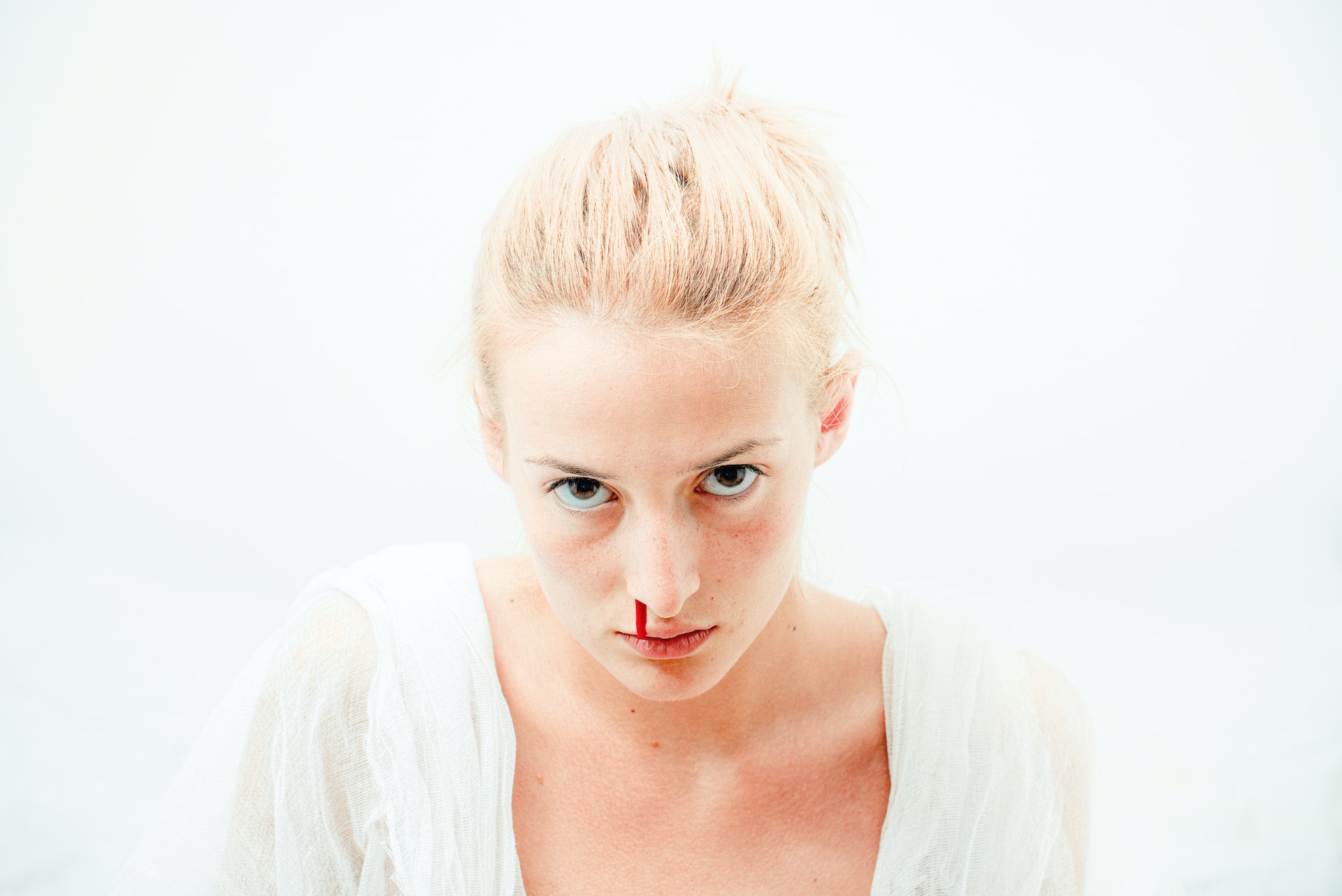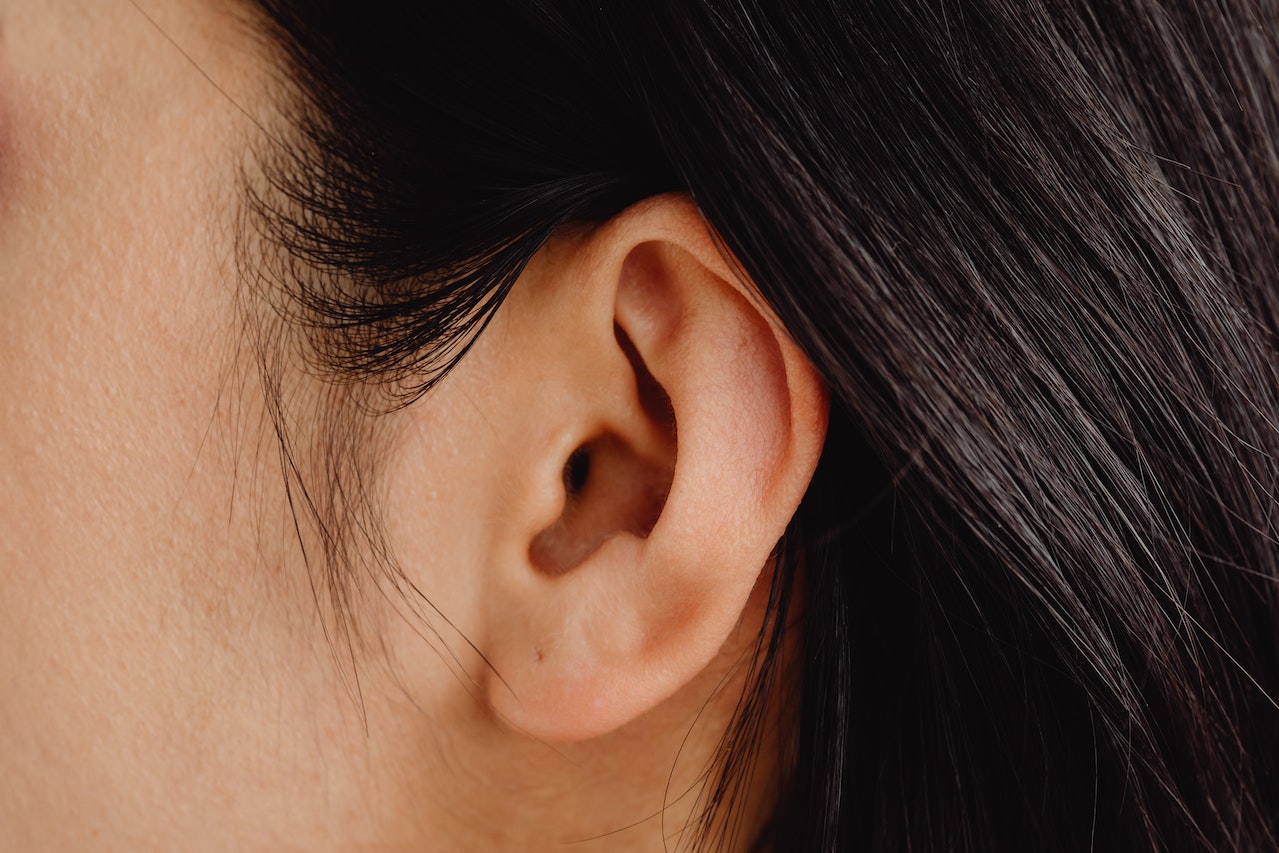You know that scene in horror movies where the faucet inexplicably starts spewing blood? If you’ve ever had a nosebleed, you know that it feels eerily similar (minus the creepy background music and haunted house setting). Yes, we’ve all been there: chatting with a cute barista, trying to convince your boss you’re the right person for that promotion, or simply taking a nap on your pristine white sofa, when suddenly, your nose decides to imitate Mount Vesuvius and erupt.
So, let’s dive nose-first into the nitty-gritty of managing that unruly schnoz of yours, shall we?
How to Stop a Nosebleed
1. Defy Gravity
The first and most essential step? Do NOT tilt your head back. This may be the advice your grandmother gave you, but grandma also believed that washing jeans more than once a year was ‘spoiling them’. Tilting your head back can actually cause the blood to flow down your throat. It’s not as goth as drinking blood, but trust me, it’s definitely not something you want to experience.
2. Pinch, Don’t Pick
I get it. There’s a perverse joy in picking at things. But resist the urge to dig for gold, and instead gently pinch the soft part of your nose using your thumb and index finger. Hold for about 10 minutes (yes, it’s a long time, but think of all the scrolling through TikTok videos you can catch up on!). This action puts pressure on the bleeding point in the nasal septum, helping the blood to clot and stop the flow. Remember, it’s pinch, not pick. Save the gold digging for later.
3. Lean Forward, Like You’re About to Share Some Gossip
No, you’re not trying to overhear the latest office drama. Leaning forward prevents that oh-so-tasty blood from going down the back of your throat (again, not goth). Make sure you’re sitting upright and catch any blood with tissues or a cloth. If you’re out of tissues, well, there’s always the sleeve of that guy next to you (just kidding…maybe).
4. Keep It Cold
Grab a cold pack or a bunch of ice wrapped in a cloth and place it on the bridge of your nose. If you’re thinking, “What if I don’t have ice?”, frozen peas will do the trick. The cold helps constrict the blood vessels and reduces the bleeding. Plus, it gives you that refreshing wake-up sensation if you’re about to doze off from the sheer drama of it all.
5. Aromatherapy? More Like Aroma-Scareapy
Okay, this one’s a wildcard and not scientifically proven, but some say sniffing a strongly scented substance like an onion or ammonia can stop a nosebleed. If you’re desperate enough to try this, and you happen to have an onion or smelling salts in your purse (because who doesn’t?), go ahead. But be warned: This method might earn you the title of “office weirdo”.
How to Prevent Nosebleed
Alright, you’ve mastered the art of stopping your facial geyser mid-eruption, and for that, we salute you. But why just stop when you can prevent? It’s like being content with putting out fires instead of just not starting them in the first place. Let’s pivot from immediate crisis management to forward-thinking nosebleed prevention, because, let’s be honest, a dry day is better than a bloody one. Onwards to the prevention parade!
1. The Marvelous World of Saline Solution
Dryness can be a nose’s worst enemy, like the villain in a superhero movie but with less dramatic music. Dryness often triggers nosebleeds. Keep your nose’s inner climate as lush as a rainforest by using a saline nasal spray. It’s basically the spa treatment for your nostrils. You’re welcome.
2. The Humidifier: Your Nose’s Best Friend
If you’re living in an environment reminiscent of the Sahara desert, it might be time to invest in a humidifier. This wonderful device adds moisture to the air, helping your parched nasal passages. Think of it as your nose’s knight in shining armor, gallantly fighting against dryness.
3. Hands Off!
Your nose is not a toy. Stop playing with it. Constantly poking, prodding, and picking can invite nosebleeds. If you need to keep your hands busy, might I suggest knitting? Or better yet, writing a book? Both are proven to be less harmful to your nose.
4. Ointment Overload
Much like your skin needs moisturizer during harsh winter months, so does the inside of your nose. A thin layer of a moisturizing ointment can prevent the inner linings from drying out. But don’t go squeezing a whole tube up there; remember, a little goes a long way!
5. The Nosebleed Diet: Not What You Think
While I’m not suggesting you dine on nosebleed delicacies, increasing your intake of foods rich in vitamin K can help. Foods like leafy greens, broccoli, and fish can strengthen your blood vessels. So, next time someone sees you eating a salad, you can smugly inform them it’s for your “nose health.”
6. Seek a Pro
If you’ve been employing all these hilariously genius methods and your nose still seems to think it’s auditioning for a horror film, it’s time to bring in the professionals. This might be a sign of an underlying condition that needs attention. Your doctor might recommend a nose cauterization – which sounds scary, but is a relatively simple procedure. Think of it as your nose getting some minor interior decor work done.
In conclusion, while nosebleeds might seem like a bloody betrayal by your own body, with these handy tips, you can put an end to the nose’s drama. Here’s to fewer horror movie moments and more relaxed, blood-free days!
And if all else fails? Wear red. It’s always in fashion and very practical for the occasional unexpected nosebleed. Cheers!
Pro Tips: Because Sometimes, Your Nose Needs Extra Love
- Elevate and Celebrate: If you’re prone to nighttime nosebleeds, try using an extra pillow to keep your head elevated. Think of it as giving your nose the royal treatment; it’s practically a throne!
- Nose Yoga, Anyone?: Alright, so there isn’t a dedicated nose yoga routine, but deep breathing and relaxation can help in stressful situations. Remember, stress can sometimes trigger nosebleeds. So, inhale peace, exhale drama. Let’s keep the drama to Netflix and not your nostrils.
- Avoid the Heat of the Moment: Just as dry air is the nemesis of your nose, so too is hot air. That long, steamy shower might be divine for your soul, but it’s parching for your nasal passages. Keep showers warm, not scorching, and your nose will thank you.
- Sun’s Out, Nose Balm’s Out: If you’re hitting the beach or any sunny locale, remember your nose! The skin on and around your nostrils can be vulnerable to the sun. A dab of sunblock can protect your schnoz from getting sunburned and becoming more susceptible to bleeds.
- Allergic to Nosebleeds?: Allergies can irritate your nose and make it more prone to bleeding. If you’re a sneezing machine during pollen season, consider antihistamines to reduce inflammation and itchiness. Just make sure to check the label – some can dry out the nose!
- Be Drink Aware: No, not just on a Friday night. Keeping yourself hydrated is key! Drinking ample water helps to keep the tissues in your nose moist. Consider this your nose’s version of a bottomless brunch.
- Cut the Heat, Not the Spice: If you’re a fan of spicy foods, rejoice! The spice itself doesn’t cause nosebleeds. However, the hot temperature of some foods might. So, let that spicy curry cool a bit before diving in. Your mouth (and nose) will thank you.
- Fashionably Late to the Smoke Party: If you’re a smoker or often find yourself in smoky environments, consider changing that. Smoke dries out and irritates nasal passages. And trust me, nothing is fashionable about a mid-conversation nose geyser.
- Sports Guard – Not Just for Teeth: If you’re into contact sports, consider wearing a face shield or guard. It’s not just about saving face, but also about saving your face from potential nosebleeds. Look at it as armor for your noble nose.
- To Infinity and Beyond – With Care: Traveling to high altitudes? The air can be dryer up there. So, whether you’re mountain climbing or just on a high-altitude trip, carry saline spray and keep yourself hydrated. Let’s make sure the only breathtaking views are outside, not from your nosebleed!
And remember, while these pro tips might save the day (and your outfit), always listen to your body. If your nose seems to have a life of its own and is regularly putting on a horror show, it’s definitely time to consult a doctor. Your nose might just need a bit more professional TLC.
Nosebleed FAQ: All Your Bloody Questions, Answered
Nosebleeds can be triggered by various factors, including dry air, picking your nose, allergies, injury, medications, high blood pressure, and even drastic temperature changes. Sometimes, however, they can occur without an obvious cause.
Yes! There are primarily two types: anterior (front of the nose) and posterior (back of the nose). Anterior nosebleeds are more common and easier to manage. Posterior nosebleeds are less common but can be more serious and may require medical attention.
A typical nosebleed should subside within 10 to 20 minutes when managed properly. If it continues beyond that, or if you experience frequent nosebleeds, it’s essential to consult a healthcare professional.
Yes! Tilting your head back can lead to blood flowing down your throat, which can cause coughing, choking, or even vomiting. Always lean slightly forward.
Absolutely. Dry and cold weather can dry out the nasal membranes, making them more susceptible to bleeding. That’s why moisturizing and humidifying are essential in certain climates.
While most nosebleeds are harmless, frequent or prolonged nosebleeds can be indicative of underlying health issues like blood disorders, or they could be a side effect of medications. It’s always best to consult with a doctor if you’re concerned.
Saline sprays are specially formulated to match the salt concentration of our bodies, making them gentle and effective for moisturizing nasal passages. Using plain water might further dry out or irritate the nose.
If you live in a dry environment or during winter months when indoor heating systems can reduce humidity, it’s a good idea to use a humidifier regularly. It helps maintain optimal moisture levels for nasal health.
For most people, a thin layer applied 1-2 times daily should suffice. However, always follow any specific product recommendations or consult a healthcare professional.
Seek medical attention if:
– The bleeding lasts more than 20 minutes despite applying pressure.
– The nosebleed was caused by an injury, like a fall or something hitting your face.
– You experience frequent nosebleeds.
– You’re feeling faint, dizzy, or have other health concerns related to the nosebleed.



